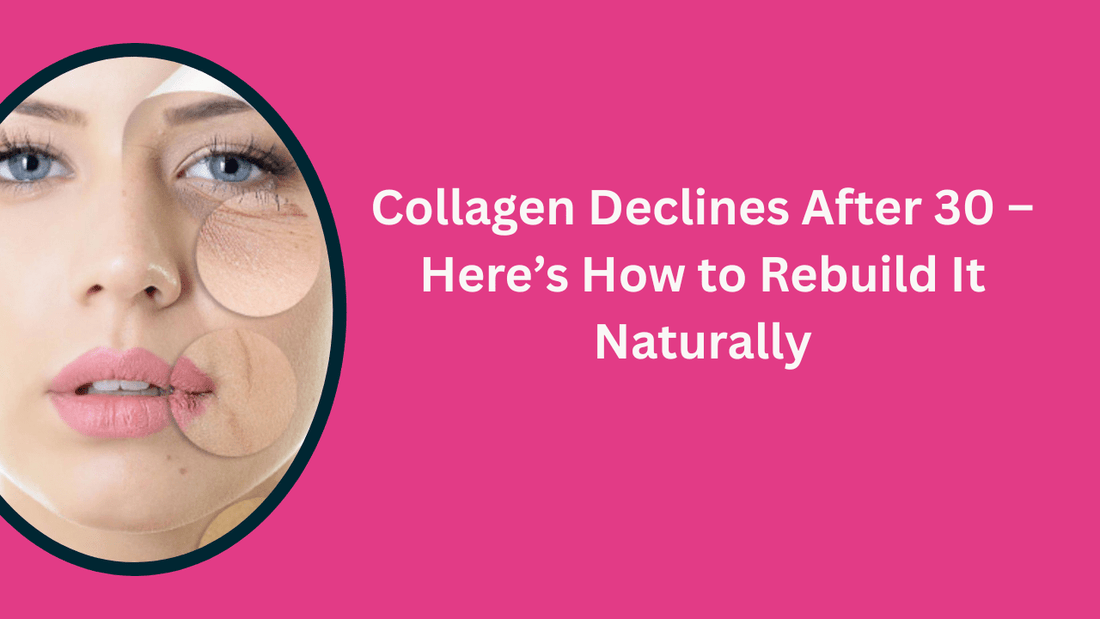
As we age, our skin’s elasticity, firmness, and glow start to decline — and the culprit is often one thing: reduced collagen production. By the time we hit 30, collagen synthesis drops by nearly 1% every year. But the good news? There are natural, effective ways to boost collagen and slow down visible signs of aging — without invasive treatments.
Let’s explore what collagen is, why it declines, and what you can do to protect and replenish it holistically.
🧬 What is Collagen and Why Is It Important?

Collagen is the most abundant protein in the human body, making up about 75% of your skin. It’s like the scaffolding that holds your skin firm and smooth. Collagen is also vital for joint flexibility, bone strength, hair growth, and even gut lining health.
But from age 25–30 onwards, your body naturally begins producing less collagen due to:
-
Aging
-
UV damage from the sun
-
Poor diet
-
Stress & pollution
-
Smoking and alcohol consumption
⚠️ Signs of Collagen Loss After 30
Wondering if your collagen levels have dipped? Look out for these signs:
-
Fine lines and wrinkles
-
Sagging skin
-
Dry or dull complexion
-
Slower wound healing
-
Weak nails and brittle hair
-
Joint stiffness
🥦 How to Boost Collagen Naturally After Age 30
Here’s a 360-degree natural guide to boost collagen production and protect your skin:
1. Nourish From Within – Best Foods for Collagen Production
Food is your first skincare product. The right nutrition can promote collagen synthesis:
✅ Vitamin C-rich foods: Oranges, kiwi, amla, bell peppers
✅ Zinc & copper sources: Pumpkin seeds, sesame, mushrooms
✅ Proline & Glycine: Bone broth, egg whites, chicken skin
✅ Omega-3 fatty acids: Walnuts, chia seeds, flaxseeds
✅ Antioxidant-rich foods: Berries, green tea, turmeric
2. Hydrolyzed Collagen Peptides – Do They Work?
Yes. Multiple studies show hydrolyzed collagen peptides, when consumed daily for 8–12 weeks, can improve skin elasticity, reduce wrinkles, and increase hydration. They’re easy to digest and get absorbed quickly.
Look for supplements with added hyaluronic acid, vitamin C, and biotin for enhanced skin glow.
3. Natural Collagen Boosting Herbs and Extracts
Certain natural herbs help stimulate the body’s own collagen production:
-
Amla (Indian Gooseberry) – Loaded with Vitamin C
-
Gotu Kola – Repairs skin and boosts collagen
-
Shatavari – Supports hormonal balance and skin texture
-
Aloe Vera – Contains sterols that promote collagen
-
Turmeric – Fights oxidative stress that degrades collagen
4. Skin Care That Supports Collagen
While internal support is key, topical care helps protect existing collagen:
-
Use broad-spectrum SPF 30+ daily
-
Look for serums with retinol, peptides, and Vitamin C
-
Avoid over-washing or harsh scrubs that damage your skin barrier
5. Collagen-Boosting Lifestyle Changes
Even small tweaks to your routine can have major skin benefits:
🛌 Sleep well: Collagen is built during deep sleep
🚭 Quit smoking: It directly breaks down collagen
🍷 Limit alcohol: Dehydrates and damages skin cells
💧 Stay hydrated: Water helps maintain skin plumpness
🧘 Reduce stress: Cortisol breaks down collagen
🌿 Bonus: The Role of Adaptogens in Skin Health
Adaptogens like Ashwagandha, Licorice Root, and Tulsi help lower cortisol levels. Less stress = less collagen breakdown. They’re great for hormonal balance too, which keeps your skin calm and radiant.
💡 People Also Ask (Based on Popular Search Queries):
❓How can I naturally increase collagen after 30?
By eating Vitamin C-rich foods, using collagen supplements, staying hydrated, managing stress, and using gentle skincare.
❓Is collagen supplementation safe for long-term use?
Yes, studies show long-term collagen use (8-12 weeks or longer) improves skin health and has no major side effects when sourced from quality suppliers.
❓What’s the best age to start collagen supplements?
Ideally, from your mid-20s to early 30s — before significant collagen breakdown begins.
❓Can I get collagen from a vegetarian diet?
You can’t get collagen directly from plants, but you can consume collagen-building nutrients from vegetarian foods and herbs.
🎯 Key Takeaways: What Really Works
| Action Step | How it Helps |
|---|---|
| Eat Vitamin C-rich foods | Stimulates natural collagen |
| Take collagen peptides | Replenishes lost collagen |
| Use sunscreen daily | Prevents collagen breakdown |
| Sleep well & stay hydrated | Supports skin regeneration |
| Try Ayurvedic herbs | Enhances collagen production |

🛍️ Want to Support Your Skin Naturally?
If you’re considering adding collagen-boosting supplements to your routine, make sure they’re clean, well-researched, and enhanced with Vitamin C, hyaluronic acid, and herbal extracts.

📌 Final Thoughts
Aging is natural — but premature skin aging doesn’t have to be. With the right mix of diet, lifestyle, herbs, and science-backed nutrients, you can boost collagen naturally and enjoy firm, glowing skin well beyond your 30s.







